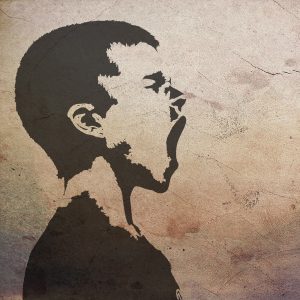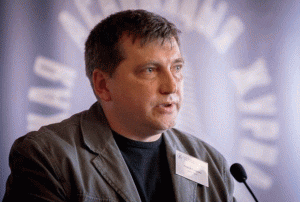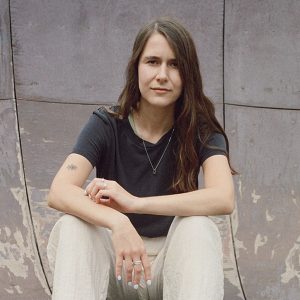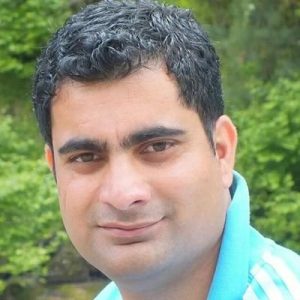22 Jun 2022 | News and features, Russia, Ukraine, Volume 51.02 Summer 2022, Volume 51.02 Summer 2022 Extras
In the dark times
Will there be singing?
Yes, there will be singing
About the dark times.
Bertolt Brecht, motto to Svendborg Poems 1939
For someone who has by now lived most of my adult life in the West but grew up in Belarus – a country that borders both Ukraine and Russia – these have certainly been dark and turbulent times.
The horror of what people in Ukraine are going through is heart-breaking. It is also confusing if my own country of birth is viewed as an aggressor or a victim.
Should people who have bravely protested in hundreds of thousands in 2020 and paid a very high price for it be now equated to the regime that rules them? Does Belarus, the country and the people, mean Lukashenka? What about Russia? The support for Putin is undoubtedly bigger there. But does Russia and Russian culture mean Putin?
Having always been a passionate advocate of freedom of expression under the most trying of conditions, what to make now of the blanket censorship of Russian and Belarusian artists not in Russia and Belarus… but in the West?
When the horror of the invasion of 24 February sank in, the Western cultural scene was immediately rocked by a succession of cancellations and calls for boycotts. Some of them were easier to understand and justify than others.
Opera singer Anna Netrebko and conductor Valery Gergiev have been tied to Putin’s regime and identified as representatives of his soft power: association with them became too toxic for Western cultural institutions. Recently, the evidence of oligarchic wealth accumulated by Gergiev due to his political connections has also come to light. This made any defence of him even more difficult
Art in some ways has always been held hostage. The authoritarian Soviet regime used the prestige of the Bolshoi and the power of Russian culture as soft power.
One is reminded of a powerful 1968 performance by cellist Mstislav Rostropovich at the BBC Proms in London where he performed – intitally to the calls of protest and with tears streaming down his face – a tortured and impassionate piece of music by a Czech composer Antonin Dvorak on the day Soviet tanks rolled into Czechoslovakia to crush the Prague Spring.
His wife, the opera singer Galina Vishnevskaya, recalled the event in her autobiography:
“In the hall, six thousand people greeted the appearance of Soviet artists with long unceasing cries, stomping, whistling, preventing the concert from starting. Some shouted: ‘Soviet fascists, get out!’ Others: ‘Shut up, the artists are not to blame!’
“Slava (his nickname) stood there completely pale, absorbing the shame for his criminal government, and I, closing my eyes and not daring to raise my head, huddled in the far corner of the viewing box. But then, finally, the hall fell silent. Dvořák’s music poured over the people like a requiem, and Rostropovich, shedding tears, spoke through his cello.
“The hall froze, listening to the confession of the great artist, who at that moment, together with Dvořák merged with the very soul of the Czech people, suffering with him and with them asking his forgiveness and praying for them.
“As soon as the last note played, I rushed backstage to Slava. Pale, with trembling lips, having not yet recovered from his experience on stage, with eyes full of tears, he grabbed my arm and dragged me to the exit:
“‘Let’s go to the hotel, I can’t see anyone.’
“We went out into the street – the demonstrators were shouting there, waiting for the musicians of the orchestra to express their indignation to them.
“Seeing the two of us, they suddenly fell silent and parted in front of us. In the ensuing silence, not looking at anyone, feeling like criminals, we quickly walked to the car waiting for us and, returning to the hotel, we could finally give vent to our despair.
“But what could we do? We did the only thing that was in our power – got drunk.”
What then should the answer to this moral dilemma be? Should musicians and artists be allowed to perform only once they have stated their opposition to their government?
And is it then morally justifiable from the point of view of Western democracies to put someone living under completely different conditions in that position? To demand dissent from someone who might not be in the position to speak freely?
The German music critic Jan Brachmann gives the example of Dmitri Shostakovich, who, in 1949, appeared at a Soviet-backed peace conference in New York, having been pressured by Stalin into attending.
The émigré Russian composer Nicolas Nabokov publicly interrogated Shostakovich about Soviet denunciations of modernist music, even though he knew that his colleague could not speak his mind. Shostakovich muttered, barely audible: “I fully agree with the statements made in Pravda.”
It is unclear what exactly had been gained from that exercise. But Gurgiev aside and any moral clarity there notwithstanding, there have been other, much less clear-cut cases recently.
Sergei Loznitsa, one of Ukraine’s most prolific filmmakers, who has explored the Maidan uprising, the Donbass war, Stalin’s personality cult and the tragedy behind the Babyn Yar massacre, has recently been expelled from the Ukrainian Film Academy for speaking out against blanket boycott of Russian filmmakers.
His opposition is based on the fact that people should be judged by their actions not their passports. It is hard to disagree. People can still love their country and feel deeply ashamed of their government’s actions.
Kirill Serebrennikov, a Russian dissenting artist of great talent, is currently also in the line of fire.
Serebrennikov, who had his homoerotic production, Nureyev, taken off stage at Bolshoi in 2017, was placed under house arrest accused of embezzling theatre funds – a charge widely seen as being politically motivated. He was not allowed to attend a premiere of his production of Cosi Fan Tutte at Zurich Opera nor to the Cannes premiere of his hugely acclaimed ode to rock ‘n’ roll and dissent in 1980s Leningrad, Leto.
Recently Bolshoi has once again cancelled a scheduled production of Nureyev, this time as a retaliation for him speaking up against the war. Serebrennikov told France 24 in an interview last month that “it’s quite obvious that Russia started the war”, and that it was breaking his heart.
“It’s war, it’s killing people, it’s the worst thing (that) ever might happen with civilisation, with mankind… It’s a humanitarian catastrophe, it’s rivers of blood,” he said.
And yet the Ukrainian State Film Agency opposed Serebrennikov’s inclusion in Cannes Film Festival and the premiere of his new film on the grounds that he is a Russian filmmaker, and it was unacceptable in times of war. While this reaction is humanly understandable and can even be seen by some as a moral decision, we need to ask ourselves who ultimately benefits from silencing, cancelling, de-platforming and similar methods? It is never a viewer, a reader or any ordinary person.
The power of art is in our shared humanity and not in division. Art and its healing power is what gets us through the hard and dark times. We need to show solidarity with people in Ukraine and Ukrainian artists, shine a spotlight on their experiences and prioritise their voices, as well as support those who struggle under authoritarianism in their own countries. This is a task for any functioning democracy.
Having started by quoting Bertolt Brecht, another quotation, this time by the Soviet dissident Alexander Solzhenitsyn comes to mind: “The line separating good and evil passes not through states, nor between classes, nor between political parties either – but right through every human heart – and through all human hearts.”
This article appears in the forthcoming summer 2022 edition of Index on Censorship. Get ahead of the game and take out a subscription with a 30% discount from Exact Editions using the promo code Battle4Ukraine.
For another view, read Marina Pesenti’s article where she argues that promoting Russian culture risks furthering Putin’s agenda.
10 Jun 2022 | Belarus, Brazil, China, Hong Kong, Opinion, Philippines, Russia, Ruth's blog, Ukraine, United Kingdom, United States

This week has been awful.
The news has been devastating and all consuming. But that feels like it’s becoming the norm.
In Belarus, our friends remain under attack – Andrei and Irina’s trial began on Monday. We have no idea of the outcome.
In Brazil, Dom Phillips and his colleague Bruno Araújo Pereira remain missing – but with reports of fresh blood being found, our hearts break for their loved ones.
In Ukraine, we see daily the death and destruction caused by the Russian invasion, up to 200 Ukrainian soldiers killed a day. And the reports of cholera in Mariupol are beyond my comprehension in the twenty-first century.
In Russia, the crackdown against dissidents continues unabated – with limited coverage. 160 people are currently defending criminal cases for anti-war statements and this week a close associate of Alexei Navalny was tried in absentia and placed on the international wanted list.
In the Philippines, Ferdinand Marcos Jr has been elected as the next President and made his first visit to the US as President-Elect – seemingly the legacy of his parents no longer an electoral or diplomatic issue.
In Hong Kong, six brave democracy protesters were arrested for the temerity of marking the anniversary of Tiananmen Square.
In the US – the inquiry into the Capitol Riot is officially underway – highlighting just how fragile our collective democracy is and how desperately we need to cherish and protect it.
And that’s before I even touch on what is happening in the UK, the ongoing political crises, and the ideologically incoherent approach to freedom of expression protections.
And in too many countries this is now framed through the prism of a cost-of-living crisis as a scale that we haven’t seen for a generation.
My only comfort is that we know what is happening. In a digital age it is very difficult for any leader, however repressive, to completely silence dissent about their domestic actions. The joy of a free press in democratic countries is that it enables us to be informed and to demand more and better – from our own leaders and from those that claim a global role. It enables us to analyse the scale of the threat and to try and prioritise our efforts in assisting those brave enough to stand against tyranny.
Index exists to provide a platform for the persecuted. We work every day with those who refuse to be silenced. The least we can do is listen to them and then join their fight.
20 May 2022 | Belarus, Media Freedom, News and features, Russia, Ukraine
The free press in Belarus is under threat like never before in the wake of the disputed re-election of Aleksandr Lukanshenka in August 2020, with journalists being threatened, fined, arrested and tortured for speaking out against the country’s ruler. Indeed, former Index employee and contributor Andrei Aliksandrau remains in prison, facing a sentence of up to 15 years for alleged “high treason”.
A year after the elections, the Belarusian authorities went a step further in clamping down on media freedom, banning the country’s journalism body, the Belarusian Association of Journalists.
Despite the challenges, the BAJ continues to receive support and, at the end of April, the organisation was awarded the 2022 UNESCO/Guillermo Cano World Press Freedom Prize.
Index spoke with BAJ chair Andrei Bastunets in the wake of the award, talking about the worsening situation for independent media and how BAJ continues to support press freedom.
Is it still possible to work as an independent journalist in Belarus following the start of the war in Ukraine?
“The key problems for Belarusian independent journalists arose before the war in Ukraine, and even before the 2020 presidential election. But after the elections – and journalists’ coverage of post-election protests – the pressure on the media, journalists and bloggers has increased dramatically (although earlier Belarus had bad ranking positions in international free speech ratings and indexes too). In 2021, many journalists and even entire editorial offices were forced to flee the country in order to avoid criminal prosecution by the Belarusian authorities and to be able to continue their professional activities.”
“A lot of Belarusian journalists – more than 100 – who were forced to leave their country chose Ukraine as a place of refuge. But after the start of the Kremlin’s war against this country, they had to leave their homes and belongings again and move to other countries. Journalists and bloggers who continue to work in Belarus face additional persecution for expressing their anti-war position. However they spread truthful information on what is happening. Last week, Baranavichy-based journalist Yury Hantsarevich was detained and accused of passing on information about Russian troop transfers in Belarus.”
How many journalists are still in detention in Belarus?

Andrei Bastunets, chairperson of the Belarusian Association of Journalists
“There are 24 journalists behind bars at the moment. Eight of them are serving their terms in prison, and the rest are in custody pending trial. All are deemed political prisoners by Belarusian human rights organisations.”
“In the first four months of 2022, five sentences were handed down against journalists in criminal cases – from 1.3 to 2.5 years in prison. The maximum punishment for a journalist has been a 15-year strict regime sentence for blogger Ihar Losik, who was a consultant for the Belarusian service of Radio Liberty.”
“My friend and former Index staff member Andrei Aliaksandrau has been in jail since January 2021; and recently the Belarusian Investigative Committee reported on the charges against him under four criminal articles, including Article 356 (high treason) which outlines a punishment of up to 15 years in prison.”
How is the war (or special military operation as Putin would have it) being reported in Belarus?
“There is a difference in the approaches of state-run and independent media outlets. In the news agenda of the independent media, the war in Ukraine is being called ‘war’ and it is on their front pages. These media outlets are publishing mostly online now because they do not have an opportunity to publish in print after printing houses and state monopoly distribution chains were banned from cooperation with the independent press. The state television and other government-backed media in Belarus are reporting on the war in Ukraine spreading the narratives of the Russian pro-Kremlin media.”
Is the BAJ still operating and is it having to do so from exile?
“In August 2021, the Supreme Court of Belarus ordered the dissolution of the organisation, at the request of the country’s Ministry of Justice. Now, BAJ is not an organisation registered by the Ministry, it is not a formal structure. It is about 1,300 people united in implementing their common idea and their mission – to expand the space of free speech in Belarus. And an official’s resolution has not affected our activities. Most of the organisation’s leadership had to leave the country after a series of police raids and interrogations by investigators, after arrests of our colleagues and friends, but we continue our work from abroad. We treat all media outlets of Belarus, regardless of whether they stayed in the country or moved abroad, as a single Belarus media sector. And we are providing all the necessary and possible support to this media sector.”
How important is the recognition through awards of BAJ, such as the Unesco award recently?
“We regard the UNESCO award as support for the entire independent journalistic community in Belarus. By the way, within literally two days, BAJ received three awards. In addition to UNESCO/Guillermo Cano World Press Freedom Prize, there was the award from the Swedish section of Reporters Without Borders (RSF) and Difference Day Honorary Title for Freedom of Expression from Brussels ULB and VUB universities. They are very important for our organisation as appreciation of our work, but even more as a high assessment of Belarusian journalists’ work in extremely difficult conditions. And, of course, it is important for us that Belarus has returned to the front pages of the international media. Although, we understand indeed that current events in Ukraine are attracting general attention as the state of affairs in the region and of the entire system of world security formed after WWII depend on their development.”
16 May 2022 | Awards, Fellowship, Fellowship 2022, Kenya, Qatar, Russia, Venezuela
 Sonya Groysman is a Russian journalist and podcaster. Despite being labelled as a ‘foreign agent’ by Russian authorities she has continued to report on human rights issues and censorship in Russia.
Sonya Groysman is a Russian journalist and podcaster. Despite being labelled as a ‘foreign agent’ by Russian authorities she has continued to report on human rights issues and censorship in Russia.
Sonya Groysman was working for the investigative outlet Proekt in 2020 when the site was labelled as ‘undesirable’ by Russian authorities. Soon after, Groysman and many of her former colleagues were labelled as ‘foreign agents’. Groysman is now required to attach a disclaimer to all published work – including social media posts: “THIS NEWS MEDIA/MATERIAL WAS CREATED AND/OR DISSEMINATED BY A FOREIGN MASS MEDIA PERFORMING THE FUNCTIONS OF A FOREIGN AGENT AND/OR A RUSSIAN LEGAL ENTITY PERFORMING THE FUNCTIONS OF A FOREIGN AGENT.”
Facing significant challenges working as a journalist with the ‘foreign agent’ label, Groysman and her colleague Olga Churakova set up their podcast titled “Hi, You’re a Foreign Agent” in 2021. The podcast combines dark humour (how does one’s boyfriend or grandmother react to having a loved one named “foreign agent”? does one have to identify her “foreign agent” status on Tinder?) with personal stories and journalism.
Groysman has continued to face legal issues related to her reporting. In August 2021 she was arrested in front of the F.S.B building in Moscow for participating in a peaceful protest in support of independent media. She was released soon after.
Groysman has managed to maintain an active career as a journalist despite the ‘foreign agent’ label. Days before the invasion, Groysman was reporting from the Russian/Ukrainian border for the independent TV station TV Rain. Like most other independent news outlets in Russia, TV Rain was shut down by the authorities for allegedly spreading misinformation about the war. Fearing legal persecution as an independent journalist, Groysman decided to flee to Turkey. She continues to produce her podcast and report on human rights issues in Russia from abroad.
 Bilal Hussain is a journalist based in Srinagar in Kashmir. He focuses his reporting on freedom of expression issues.
Bilal Hussain is a journalist based in Srinagar in Kashmir. He focuses his reporting on freedom of expression issues.
Despite internet shut-downs and a day-to-day fear of persecution and censorship, Hussain continues to report on the conditions in Kashmir. He has been particularly concerned by the increasing censorship as a consequence of the Covid-19 pandemic.
In February 2022, the Kashmir Press Club was shut down by authorities. The independent body had done important work to offer legal support to journalists and to establish a sense of community among Kashmiri journalists. Hussain views this as another important blow to media freedom and free expression in Kashmir. Hussain has witnessed colleagues being imprisoned for doing their job and reporting on the conflict in Kashmir. Despite the threats, he continues to report on the situation and fight for free expression through independent news publications and social media.
Recent developments in Kashmir severely limit press freedom. Reflecting on this, Hussain says: “There have been many cases where journalists have been threatened with UAPA [Unlawful Activities (Prevention) Act]. These actions hamper the work of journalists and stop them from discharging their normal duties.”
Hussain is a regular contributor to Voice of America News and NIKKEI Asia among other publications. Through his reporting, Bilal brings international attention to the ongoing conflict and media rights situation in Kashmir.
 Huang Xueqin is an activist and journalist who has worked with several domestic Chinese media outlets. She has reported extensively on the MeToo movement in China.
Huang Xueqin is an activist and journalist who has worked with several domestic Chinese media outlets. She has reported extensively on the MeToo movement in China.
Huang Xueqin played a significant role in covering the MeToo movement. In 2017, she surveyed hundreds of female journalists across 15 provinces in China on their experience of workplace sexual harassment. She published her findings in a report in March 2018. She also assisted Luo Xixi, one victim of sexual harassment, to publicly submit a complaint against her professor. Her work sparked national discussions on sexual harrassment on campuses.
Huang has worked to promote women’s rights, and to document and expose sexual harassment against women and girls. Unfortunately, she has faced legal challenges because of her work as an activist and journalist. She was detained between October 2019 and January 2020 and charged with “picking quarrels and provoking trouble” after writing about mass protests in Hong Kong.
On 19 September 2021, Huang disappeared and stopped responding to phone calls from family and friends. Two months later, in November, it was confirmed that she had been detained along with labour activist Wang Jianbing and charged with “inciting subversion of state power”. She was due to travel to the UK to study development studies at the University of Sussex after receiving a Chevening Scholarship. She remains in detention and is now held in the No. 1 Detention Centre in Guangzhou.



 Sonya Groysman is a Russian journalist and podcaster. Despite being labelled as a ‘foreign agent’ by Russian authorities she has continued to report on human rights issues and censorship in Russia.
Sonya Groysman is a Russian journalist and podcaster. Despite being labelled as a ‘foreign agent’ by Russian authorities she has continued to report on human rights issues and censorship in Russia. Bilal Hussain is a journalist based in Srinagar in Kashmir. He focuses his reporting on freedom of expression issues.
Bilal Hussain is a journalist based in Srinagar in Kashmir. He focuses his reporting on freedom of expression issues. Huang Xueqin is an activist and journalist who has worked with several domestic Chinese media outlets. She has reported extensively on the MeToo movement in China.
Huang Xueqin is an activist and journalist who has worked with several domestic Chinese media outlets. She has reported extensively on the MeToo movement in China.